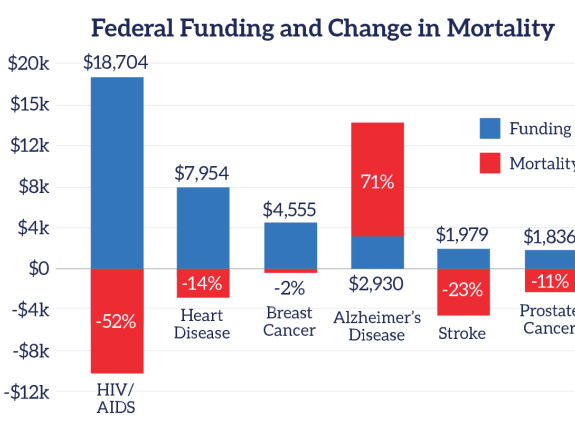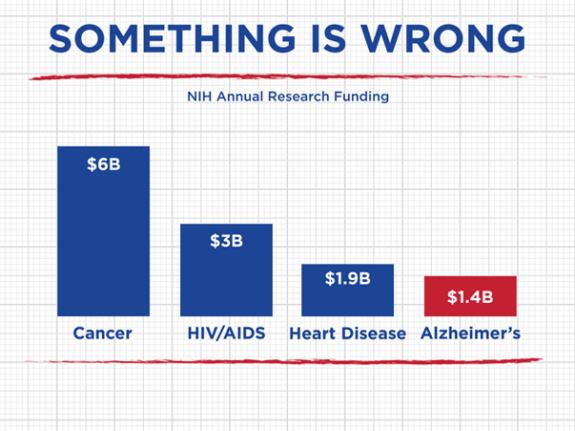Sign Up To Receive Key Information About Alzheimer's:
What Is Alzheimer’s?
Alzheimer’s disease is the most common form of dementia, a progressive brain disease that slowly destroys memories and thinking skills. Alzheimer’s often starts 5, 10, or even 20 years before symptoms appear. Symptoms usually start with difficulty remembering new information. In advanced stages, symptoms include confusion, mood and behavior changes, and inability to care for one’s self and perform basic life tasks. Alzheimer’s is ultimately fatal.
UsAgainstAlzheimer’s knows that this is unacceptable and is working to stop Alzheimer’s.
How Many People Have Alzheimer’s?
Alzheimer’s Affects Millions
- Approximately 5.7 million people in the U.S. currently have Alzheimer’s disease. The number of Americans with Alzheimer’s is projected to triple to 16 million by 2050.
- Someone in the United States develops Alzheimer’s every 65 seconds. By 2050 this is projected to be every 33 seconds.
- Alzheimer’s is not just a disease of old age: 200,000 people under age 65 have early-onset Alzheimer’s disease.
- Worldwide about 50 million people have some form of dementia, and someone in the world develops dementia every three seconds.
Alzheimer's Is Ultimately Fatal
- Alzheimer's Disease takes the lives of an estimated 500,000 Americans every year.
- It is the only top-10 cause of death in the United States with no known cure.
Alzheimer’s Hits Some Communities Harder
- Alzheimer’s disproportionately impacts women and communities of color. For more information on gender and race disparities, see our disparities page.

Federal Funding and Change in Mortality
The Costs of Alzheimer’s Care
The Most Expensive Disease in the Nation
A 2017 report from UsAgainstAlzheimer’s shows that the U.S. has vastly underestimated the public costs and consequences of the Alzheimer’s epidemic, and major social trends have direct and adverse implications for our capacity to cope with the Alzheimer’s epidemic in the years ahead.
- Total annual out-of-pocket payments in the U.S. for healthcare, long-term care, and hospice care for people with Alzheimer’s and other dementias are projected to reach $1.1 trillion by 2050, if we don’t develop a treatment or cure.
- Medicare and Medicaid only cover $175 billion, or approximately 68% of the out-of-pocket healthcare costs.
- Medicaid payments are on average 23 times higher for those with Alzheimer’s compared to those without, and Medicare payments are three times greater on average. By 2050, Alzheimer’s is expected to increase Medicare and Medicaid costs by over 330%.
- More than $250 billion is spent annually in out-of-pocket healthcare for Alzheimer’s, which is more than 179 times the amount spent on finding a cure.

Something is Wrong
Where Are We on the Path to Finding a Cure?
Federal Research Funding Is Inadequate for the Scope of the Problem
- The research community believes it will be possible to prevent or control Alzheimer’s within the next 10 years if adequate research funding and other reforms to accelerate the drug pipeline are put in place.
- However, federal research funding is a fraction of that of other major diseases.
- For every dollar the federal government spends today on the costs of Alzheimer’s care, it invests less than a penny in research to find a cure.
Clinical Trials and Research
- Important clinical trials that focus on potential prevention and treatment for Alzheimer’s are under way, but we must continue to urge that these trials be sped up and that participants reflect the diversity of all those with Alzheimer’s. See our clinical trial page for more information.
- It is important that our government officials make fighting Alzheimer’s a national priority and dedicate adequate resources to research. Go to our action center for concrete ways that you can help.
- UsAgainstAlzheimer’s Chairman and Co-Founder George Vradenburg serves on the World Dementia Council to tackle this problem globally. Find out more about their work here.
